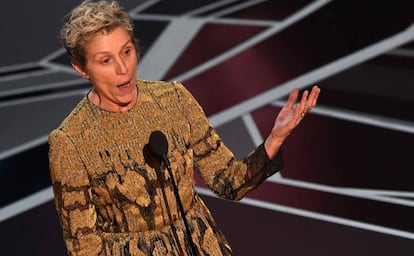Guillermo del Toro conquers the most Mexican Oscars to date
Thanks to his win with ‘The Shape of Water,’ four films from directors from Mexico have taken the top gong at the Academy Awards in the last five years


The audience in the Dolby Theater and the world over could barely contain their chuckles when Warren Beatty and Faye Dunaway appeared again last night to give out the Best Film award. This year, however, there were no doubts as to whether they had the right envelope. The Shape of Water, a love story where the protagonists are a sea monster and a deaf caretaker, was the film of the year for the Academy of Motion Picture Arts and Sciences. And it was directed by a Mexican filmmaker, Guillermo del Toro, who also took the prize for Best Director.
Del Toro’s win for The Shape of Water marks the fourth for a Mexican director at the Oscars in the last five years. That last sentence is worth reading twice. Del Toro has managed to win over the Hollywood elite with a fable that has all the elements to never have gotten made in the first place, as he joked from the stage. “I’m an immigrant, […] like my compadres, […] and like many, many of you,” he said in his acceptance speech. “The greatest thing our art does and our industry does is to erase the lines in the sand,” he added.
Mexico entered the Dolby Theater last night, got up on the stage right from the start, and didn’t come back down again
Mexico entered the Dolby Theater last night, got up on the stage right from the start, and didn’t come back down again. There have been many moments of recognition for Latinos in recent years, prizes for directors, songs… But nothing like what was seen on Sunday. Actress Eiza González (Baby Driver) and producer, writer and actor Eugenio Derbez took on presenting roles; the song Recuérdame was performed by the singers Miguel and Natalia Lafourcade and the actor Gael García Bernal on the stage. The award went to that song. The Oscar for Best Animated Film went to Coco, the Mexican tale that has conquered the United States. The director, Lee Unkrich, said on the stage that it was important for “children to see characters who live and speak like them.” For the first time, this was more than just a cliché.
For perspective on the importance of the moment, in attendance was Rita Moreno, the first Latina to win an Oscar, for West Side Story in 1962. Moreno often tells the story of how she had to force her accent, and, due to the color of her skin, she was condemned to a career of being the token ethnic actress – whatever the ethnicity might be. Minutes after the ceremony started, Eiza González and fellow actress Gina Rodríguez posed for a photo with Moreno in the lobby of the Dolby Theater. On the stage, she received a standing ovation. Hollywood had already discovered Mexican directors. This was the year that it embraced Mexico, independently of whatever was going on with Guillermo del Toro.
On the stage there were shouts of “¡Viva Mexico!” and also “¡Viva Latin America!” The first Oscar ever for Chile was given to the moving A Fantastic Woman, a movie that is playing at plenty of theaters in Los Angeles – no mean feat for a candidate for Best Foreign Language Film. The true godfathers of current Chilean cinema, Pablo Larraín and Juan de Dios Larraín, the director Sebastián Lelio and the extraordinary Daniela Vega all took to the stage. The Hollywood elite recognized Vega with a special ovation when Lelio mentioned her name.

Lelio told reporters that the story of his movie takes place in a state where the “existence of transsexuals is not recognized. I hope that this prize and the amplification that it involves will help to give relevance to this urgent issue. A transsexual is not a second-class citizen.”
Aside from Mexico, the 2018 Oscars will also be remembered for the #MeToo movement. The ceremony had to acknowledge the profound change in culture – unthinkable just six months ago – that the revelations about sexual abuses in the sector have brought. A special film introduced by Ashley Judd, Annabella Sciorra and Salma Hayek – three of the victims of some of the more disturbing stories of abuse by disgraced producer Harvey Weinstein – explained how Hollywood has finally started to show protagonists who are women, African American, Mexican and Indian…
This has been the year of Coco, Wonder Woman and Black Panther. Hits that would have been unthinkable just a year ago, as presenter Jimmy Kimmel explained. Geena Davis pointed out that after Thelma and Louise (1991) it looked as if everything was going to change in terms of how woman are represented on the screen, but it didn’t happen that way.
The ceremony ended with a very televisual moment. From the stage, Best Actress winner Frances McDormand called for a “bit of perspective.” She called on all of the women nominated in all of the categories of these Oscars to stand up so that the whole world could see who they are and how many of them there were.
Sunday saw the Academy celebrate its 90th birthday. Perhaps with this change in course, it will be around for a few more decades yet.
English version by Simon Hunter.
Tu suscripción se está usando en otro dispositivo
¿Quieres añadir otro usuario a tu suscripción?
Si continúas leyendo en este dispositivo, no se podrá leer en el otro.
FlechaTu suscripción se está usando en otro dispositivo y solo puedes acceder a EL PAÍS desde un dispositivo a la vez.
Si quieres compartir tu cuenta, cambia tu suscripción a la modalidad Premium, así podrás añadir otro usuario. Cada uno accederá con su propia cuenta de email, lo que os permitirá personalizar vuestra experiencia en EL PAÍS.
¿Tienes una suscripción de empresa? Accede aquí para contratar más cuentas.
En el caso de no saber quién está usando tu cuenta, te recomendamos cambiar tu contraseña aquí.
Si decides continuar compartiendo tu cuenta, este mensaje se mostrará en tu dispositivo y en el de la otra persona que está usando tu cuenta de forma indefinida, afectando a tu experiencia de lectura. Puedes consultar aquí los términos y condiciones de la suscripción digital.








































